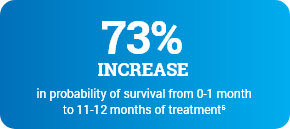- KYPROLIS® (carfilzomib) is indicated in combination with dexamethasone, or with lenalidomide plus dexamethasone, or with daratumumab plus dexamethasone, ... Read More Close
at first relapse is a pivotal decision with lasting impact for your patients1
Efficacy decreases with each successive line of therapy, with ~50% reduction in response rates from first to third relapse2
Typical Disease Trajectory of Multiple Myeloma: depth and duration of response3,4

Progressive decline in overall response rates (≥PR): An International Myeloma Foundation study of 383 patients with multiple myeloma who had a documented relapse between January 2007 and June 2010, including 220 from Europe, 106 from Asia, 31 from South America, and 26 from North America, found a decline in response rates over time from 58% at first relapse to 45% at second relapse and 30% at third relapse.2
L, line of therapy; PR, partial response.
Prolonged duration of therapy corresponded with improved overall survival in patients treated for RRMM5
Predicted Probability* of 1-Year Overall Survival by Duration of Second-Line Therapy, 20155

A retrospective observational study of de-identified Humedica electronic medical record data. 628 adults with newly diagnosed multiple myeloma from January 2008 to June 2015 were followed up to identify their second-line therapy. The duration of therapy and time to next therapy, as a proxy for progression-free survival, were estimated using the Kaplan-Meier method. The relationship between the duration of second-line therapy and overall survival was evaluated with a logistic marginal structural model to mitigate the risk of treatment selection and survival bias.5
*Statistical outcomes of a marginal structural model analysis adjusted for patient, disease, and treatment factors that could confound the relationship between duration of therapy and 1-year mortality. Please refer to the manuscript and supplementary appendix for additional details. Odds ratio (OR) represents the odds of 1-year mortality for each additional month of continued therapy.
L, line of therapy; CI, confidence interval; OR, odds ratio; RRMM, relapsed or refractory multiple myeloma.
Please see accompanying full Prescribing Information.
Please see accompanying full Prescribing Information.
References: 1. Yong K, Delforge M, Driessen C, et al. Multiple myeloma: patient outcomes in real-world practice. Br J Haematol. 2016;175:252-264. 2. Durie BG, Moreau P, Sonneveld P, et al. Regional differences in the treatment approaches for relapsed multiple myeloma: An IMF study. J Clin Oncol. 2012;30:8095. 3. Kurtin SE. Relapsed or relapsed/refractory multiple myeloma. J Adv Pract Oncol. 2013;4:5-14. 4. Durie BGM. Concise review of the disease and treatment options: multiple myeloma cancer of the bone marrow. 2018 ed. International Myeloma Foundation website. https://www.myeloma.org/sites/default/files/resource/ConciseReview.pdf. Accessed November 14, 2024. 5. Hari P, Romanus D, Palumbo A, et al. Prolonged duration of therapy is associated with improved survival in patients treated for relapsed/refractory multiple myeloma in routine clinical care in the United States. Clin Lymphoma Myeloma Leuk. 2018;18:152-160. 6. Hari P, Romanus D, Palumbo A, et al. Prolonged duration of therapy is associated with improved survival in patients treated for relapsed/refractory multiple myeloma in routine clinical care in the United States [supplemental appendix]. Clin Lymphoma Myeloma Leuk. 2018;18:152-160.